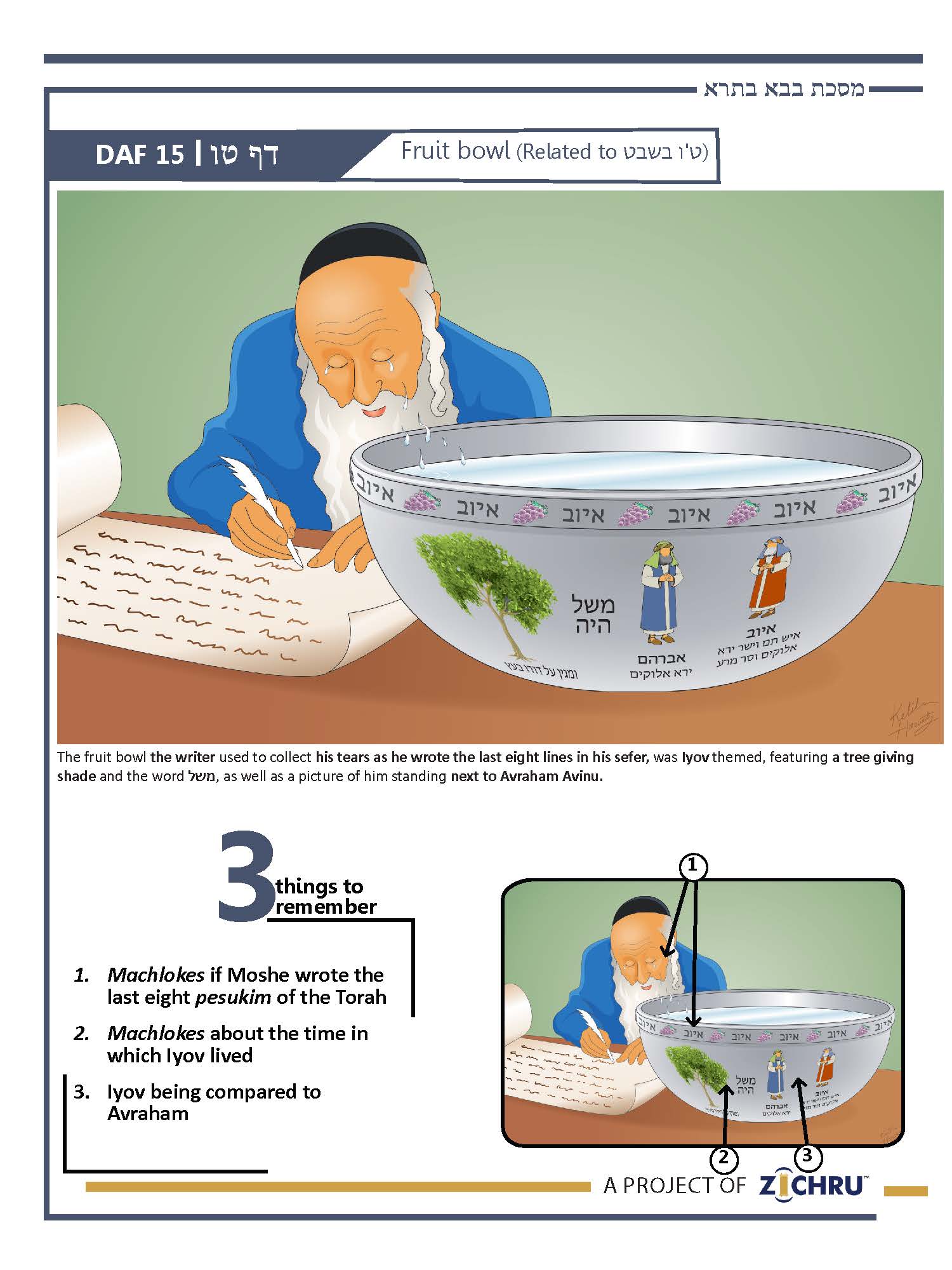Bava Basra - Daf 15
- Audio Timestamps
0:00 - The 3 Sugyos
3:28 - Review of 3 Sugyos
6:39- Siman
9:04 - 4 Blatt Back Chazarah
15:23 - Pop Quiz (Last 7 blatt)
For access to all Zichru resources including PDFs, and illustrations CLICK HERE
- Machlokes if Moshe wrote the last eight pesukim of the Torah
The Baraisa teaches the authorship of the seforim of Tanach. It states that Moshe wrote the Torah, but that Yehoshua wrote the last eight pesukim. This is a machlokes Tannaim: Rebbe Yehudah (or Rebbe Nechemiah) says that since it is impossible for Moshe to have written "וימת שם משה" – and Moshe died there, we must say that Yehoshua wrote these pesukim. Rebbe Shimon objected, is it possible that Moshe’s Torah was missing even a single letter?! But the passuk implies it was complete!? Rather, until this point Hashem would dictate to Moshe, and Moshe would repeat it and write it, but for the final eight pesukim, Hashem would dictate, ומשה כותב בדמע – and Moshe would write with tears. Rav said: שמונה פסוקים שבתורה יחיד קורא אותן – regarding the last eight pesukim of the Torah, a single person must read them during קריאת התורה, and they cannot be interrupted. The Gemara suggests that this follows Rebbe Yehudah’s opinion, that Yehoshua wrote them, so their laws are different. However, it answers that even if Moshe wrote them, הואיל ואשתנו אשתנו – since they were written differently (i.e., with tears), they are different from the rest of the Torah.
- Machlokes about the period in which Iyov lived
The above Baraisa taught that Moshe wrote Iyov. This supports Rebbe Levi bar Lachma, who said Iyov lived in Moshe’s time. Rava says he lived at the time of the מרגלים sent by Moshe, and when he told them to see "היש בה עץ" – whether there are trees in [Eretz Yisroel], he meant: ישנו לאותו אדם ששנותיו ארוכות כעץ – there is a certain man [Iyov] living in Eretz Yisroel, whose years are many like a tree’s, ומגין על דורו כעץ – and who protects his generation like a tree protects with its shade. A certain scholar said before Rebbe Shmuel bar Nachmani: איוב לא היה ולא נברא – Iyov never lived, and was never created. אלא משל היה – Rather, the story of Iyov is a parable. Rav Shmuel objected that a passuk clearly indicates that he lived. Rebbe Yochanan and Rebbe Elazar said that Iyov was among those who ascended from the exile in Bavel, and his beis medrash was in Teveria. They were challenged from a Baraisa which clearly identifies Iyov as a pious man of the other nations, and concludes that Iyov’s identity is a machlokes Tannaim. In a Baraisa, Tannaim identify him variously as someone from the time of the שופטים, Achashveirosh, the kingdom of Sheva, or the time of Yaakov. All Tannaim hold he was Jewish, except the latter opinion.
- Iyov being compared to Avraham
The Gemara commences a lengthy discussion of the story of Iyov. Hashem asked the Satan from where he was coming, and the Gemara darshens his response as saying: רבש"ע שטתי בכל העולם כולו – Master of the world! I have traveled the entire world, ולא מצאתי נאמן כעבדך אברהם – and I have not found anyone as loyal as your servant Avraham, whom You told he would receive ארץ כנען, yet when he could not find a place to bury Sarah without paying four hundred silver shekels, לא הרהר אחר מדותיך – he did not think questioningly about Your ways! Hashem responded, “Have you seen my servant Iyov? כי אין כמהו בארץ – For there is none like him on earth,” whose virtues Hashem details. Rebbe Yochanan said: גדול הנאמר באיוב יותר ממה שנאמר באברהם – Greater is [the praise] said regarding Iyov than that which was said about Avraham. Avraham is referred to as a "ירא אלקים" – one who fears Hashem, but Iyov is called: "איש תם וישר ירא אלקים וסר מרע" – a perfect and upright man, who fears Hashem and turns away from evil. The Satan protested that Iyov was especially blessed, and the Gemara describes his miraculous blessings: whoever took even a perutah from Iyov was blessed, and his sheep killed wolves. The Gemara adds that he tasted of Olam Haba, in that his plants grew immediately after seeds were planted.
Siman - Fruit Bowl (ט'ו בשבט)
The fruit bowl the writer used to collect his tears as he wrote the last eight lines in his sefer, was Iyov themed, featuring a tree giving shade and the word משל, as well as a picture of him standing next to Avraham Avinu.


